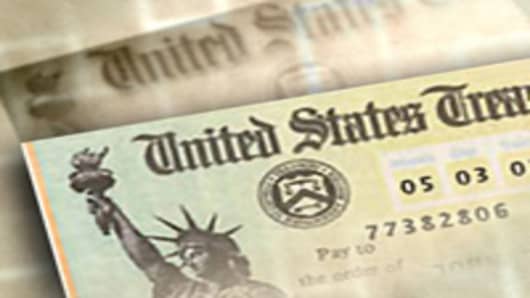The US economy probably grew modestly in the second quarter, but analysts believe the strength resulted mainly from government stimulus checks and thus won't last.
The first estimate of second-quarter gross domestic product, or GDP, will be released at 8:30 am Thursday and is expected to show an increase of about 2%, double the growth of the first quarter.
Wall Street will be watching closely for any signs of recession, which is defined at two consecutive quarters of negative GPD growth, which has not happened yet.
The expected gain in GDP is widely associated with the rebate checks, which Congress approved last spring to boost the flagging economy. Once the stimulus fades away, consumers and investors again will have to face a moribund state of affairs.
"Those fade pretty quickly" said Tom Higgins, chief economist at Los Angeles-based Payden & Rygel. "We're going to be left with this lackluster economy where housing remains a major drag, where consumers are facing not only declining home prices but they're also facing rising unemployment and high gas prices."
A median forecast of 86 economists by Reuters showed growth estimates ranging from 0.5 percent to 3.4 percent.
The report comes as unemployment rises—438,000 nonfarm jobs have been lost so far this year —and the public grows increasingly restive with what it sees as Washington's slow response to tackle economic problems.
A Reuters/Zogby index that measures the country's mood, released on July 16, showed that just 10 percent of Americans gave the Bush administration positive marks for its handling of the economy. (Is Treasury Secretary Henry Paulson a hero in fighting the credit crisis? See the video at left for the debate.)
Consumer spending is a vital element for growth since purchases of goods and services fuel two-thirds of the nation's output, but a chorus of economists polled by Reuters expect that the second-quarter spending fueled by the tax-rebate checks will subside.
"How fast can the economy grow when consumers have to go into debt consolidation and rebuilding savings?" Higgins said. "That's going to put a lid on how fast the economy can grow. Even coming out of this we're only going to see growth of 1 to 2 percent."
A further dampener is likely on Friday when the Labor Department publishes its July employment report. Economists expect it to show the economy shed jobs for the seventh straight month. The median forecast is for a drop of 75,000 jobs.
The GDP report also will contain annual revisions to the national income and product accounts going back to January 2005.
"Without the contribution from external trade, the GDP data would show an economy that would already be contracting," said Deutsche Bank which forecast a 1.0 percent growth rate. "Growth should recover only gradually next year unless there is more fiscal stimulus. There has been little over-investment in this cycle, which should help cushion some of the downside risk to the economy."
Among other analysts, JPMorgan Chase forecast 2.2 percent growth, RBS Greenwich put the number at 2.4 percent, while Global Insight predicted a 2.3 percent gain, which it said was driven mostly by net exports.


